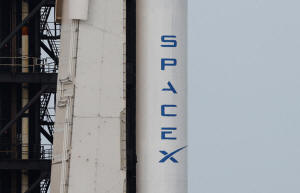Blue Origin, SpaceX and United Launch Alliance picked for Pentagon
rocket launch contracts
 Send a link to a friend
Send a link to a friend
 [June 14, 2024]
By Joey Roulette [June 14, 2024]
By Joey Roulette
WASHINGTON (Reuters) -The U.S. Department of Defense picked Jeff Bezos'
Blue Origin, Elon Musk's SpaceX and Boeing-Lockheed joint venture United
Launch Alliance (ULA) to compete for national security space missions,
making initial selections under a $5.6 billion award program.
The Pentagon did not say which of the companies' rockets it selected,
but noted seven companies bid for entry into the program, which seeks
upcoming rockets that must be ready to fly their first missions to space
by December.
The three companies are the first to be selected under the Pentagon's
lucrative National Security Space Launch Phase 3 procurement program, a
multibillion dollar competition among U.S. rocket companies vying to
launch some of the country's most sensitive military and intelligence
satellites into space for roughly the next decade.
SpaceX and ULA, two titans in the launch industry, have since 2020 been
the Pentagon's primary rocket launch providers under a predecessor
program, called Phase 2. That program gave ULA a 60% share of all
Pentagon missions through 2027, with SpaceX getting the rest.
But in the program's third phase, the Pentagon has sought a wider
variety of companies for its space missions into the next decade, mainly
to stimulate more competition in the U.S. launch sector.
The announcement on Thursday brings Bezos' rocket launch and human
spaceflight company Blue Origin into a competitive arena it has long
wanted to enter as it tries to bring its giant New Glenn rocket to
market and ramp up its competitive footing with SpaceX.
SpaceX's partially reusable Falcon 9 rocket has dominated the launch
industry while the company test launches its next-generation Starship
rocket, a massive, fully reusable launch system that Musk sees as
crucial to flying humans into space and launching large batches of
satellites into orbit.

[to top of second column]
|

The SpaceX logo is shown on a Falcon 9 rocket as it is prepared for
launch to carry NASA's SpaceX Crew-8 astronauts Matthew Dominick,
Michael Barratt, and Jeanette Epps, and Roscosmos cosmonaut
Alexander Grebenkin to the International Space Station at the
Kennedy Space Center, in Cape Canaveral, Florida, U.S., March 2,
2024. REUTERS/Joe Skipper/File Photo

While ULA's workhorse Atlas 5 rocket nears retirement, its
next-generation Vulcan rocket is poised to become the company's
centerpiece launcher. Vulcan first launched this year, and its
second mission - a crucial step to receive certification for
Pentagon missions - has been delayed but is expected to fly later
this year.
The three companies did not immediately reply to requests for
comment about their rockets' role in the Pentagon program.
The Pentagon's Phase 3 program is divided into two categories, Lane
1 and Lane 2. Lane 1, the category of Thursday's announcement,
allows more novel or specialized rockets to fly national security
missions that have less-stringent requirements. More companies, such
as Rocket Lab, are expected to be added to Lane 1 in the coming
years.
The U.S. Space Force, which manages the launch procurement program,
said Blue Origin received $5 million to provide an assessment of how
it will meet the Pentagon's launch requirements. SpaceX and ULA -
companies Space Force is more familiar with - each got $1.5 million.
Lane 2, whose awards are expected in autumn, will tap three
companies whose rockets are capable of meeting a wider variety of
national security mission requirements, indicating the most
experienced players such as SpaceX and ULA will be most fit for
awards.
(Reporting by Joey Roulette and Jasper Ward; Editing by Jamie Freed)
[© 2024 Thomson Reuters. All rights reserved.]This material
may not be published, broadcast, rewritten or redistributed.
Thompson Reuters is solely responsible for this content. |